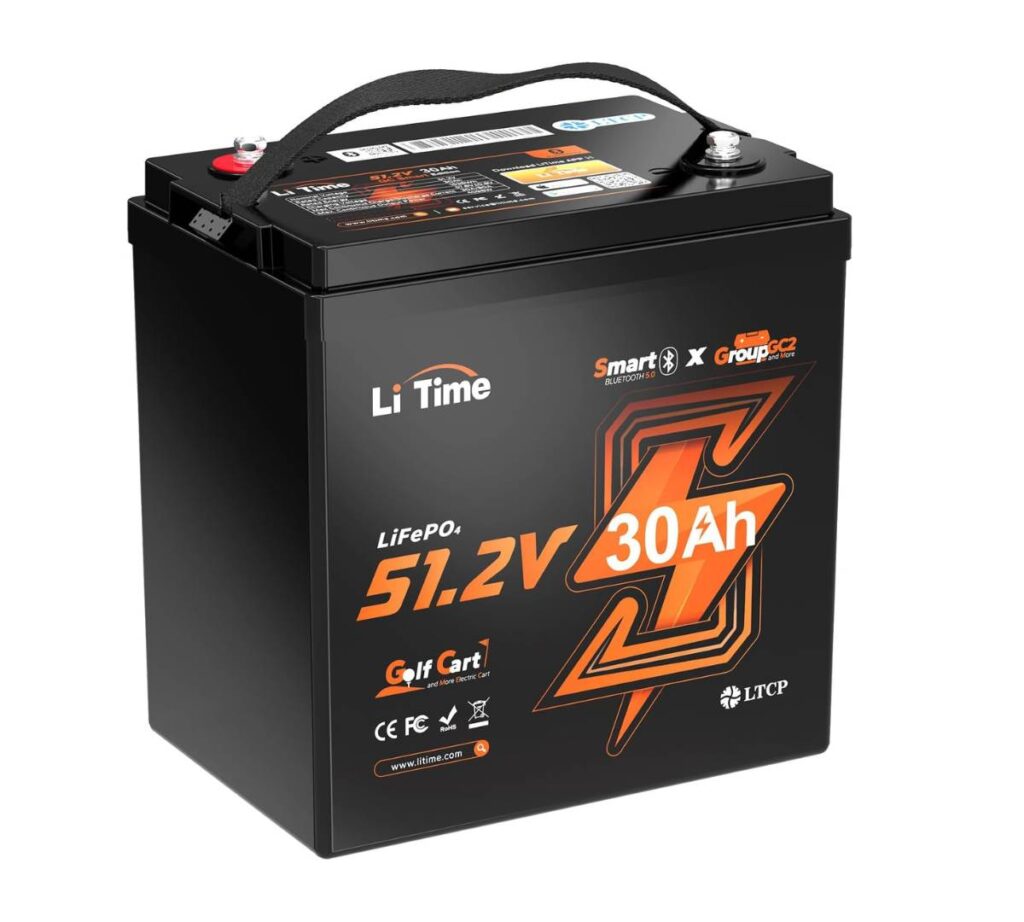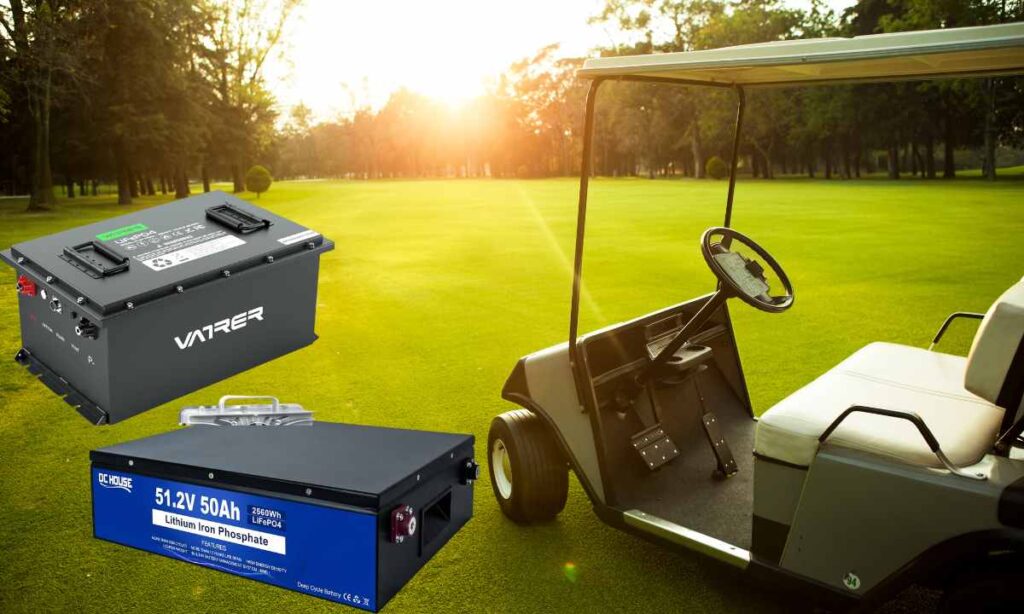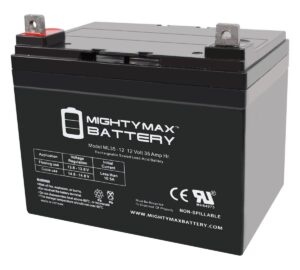A good golf cart battery ensures that your golf cart runs well. Again, a damaged or lousy battery may put you in the middle of the green. Though for a beginner or non-golfer, any golf culbs may look similar, but a pro golfer will always seek the best equipment. There are various golf battery companies and brands. The price of golf cart batteries differs depending on the manufacturer and quality. In this scenario, it’s difficult for any golfer to find the best batteries for their golf cart.
No worries! Here we are with a detailed article to help you pick the best gold cart battery for your golf cart. We analysed many factors from the perspective of a golfer, like budget, design, weight, material, longevity, and many others, to define the best golf battery for you. So, without further ado, let’s dive deep into the article.
05 Best Golf cart batteries for you

Our review team recently put the Mighty Max Battery ML35-12, a 12V 35Ah sealed lead acid (SLA) rechargeable battery, through its paces. Here’s what we found :
Installation and Compatibility
The battery measures 7.68 x 5.16 x 7.13 inches and comes with the battery and screws but no wire harness or mounting accessories. Installation was straightforward for the negative terminal, but the positive terminal required some ingenuity. We secured it using a long bolt and washers, which, while not the most elegant solution, was adequate.
Performance Testing
We tested the battery under realistic conditions using a fan that drew around 3.65 amps, simulating a typical load. This approach was more accurate. It represented the battery’s performance well. It was better than the overly optimistic C20 rate used by manufacturers. Our test revealed the battery delivered approximately 22.07Ah down to 11.6 volts over about 5.75 hours. This is below the advertised 35Ah, but managing expectations based on real-world use is essential. This battery can reliably provide around 22Ah for 1000+ cycles, which is still impressive.
Real-World Application
One of our team members tested the battery in their Nissan Leaf, which is known for not keeping the 12V battery charged when plugged in. Switching to the AGM battery helped alleviate this problem, providing a more stable charge.
Overall Impressions
The Mighty Max ML35-12 is very versatile. It works with many devices, from trolling motors to riding mowers and power chairs. Its real-world capacity might be less than the advertised 35Ah. But, it’s dependable for applications where 22Ah is enough. Paired with a 100-watt solar panel, it performed admirably in our tests.
In summary, the Mighty Max ML35-12 is a reliable choice if you keep realistic expectations and keep it within its practical limits. Our team’s rigorous review confirms its value and dependability for diverse uses.

Our review team recently had the opportunity to test the XRH 48V 100AH LiFePO4 Lithium Battery, and we’re excited to share our findings. This battery comes from the XIONGRUIHENG Store and is priced at $1,199.99, offering 8% savings from its original price.
Key Features and Installation
This 48V 100Ah battery, built with Grade-A LiFePO4 cells, boasts a remarkable energy density and stability, ensuring a long-term life of over 10 years and 5000+ deep cycles. The battery includes a 48V 20A charger and a built-in Bluetooth 200A BMS. This system protects against overcharging, over-discharging, over-current, and short-circuiting. It also protects against overheating. It has a continuous discharge capacity of 200A and a peak of 500A. Installation was straightforward, and we appreciated the included charger, which mounted quickly in our test boat.
Bluetooth & App Monitoring
One of the standout features is the built-in Bluetooth and mobile app, which allows us to conveniently monitor and control the battery from a smartphone. This feature improved our user experience by providing real-time updates on battery performance and status.
Performance in Real-World Conditions
In our tests, the battery performed exceptionally well. We used it with a Minn Kota Quest Ulterra trolling motor and were impressed by its longevity. After several trips and hours of trolling, the battery remained at 58% capacity. This level of performance is outstanding and confirms the manufacturer’s claims.
Customer Support and Durability
The battery arrived well-packaged and appeared to be of high quality. During our tests, we accidentally damaged a battery post. The customer service team was exemplary—they promptly sent a replacement package at no cost, even though the damage was our fault. This level of support is rare and highly appreciated.
The XRH 48V 100AH LiFePO4 battery exceeds expectations. It has strong performance, excellent customer support, and advanced monitoring features. It’s a top choice for anyone needing a reliable, long-lasting power source. It’s for golf carts, trolling motors, solar systems, RVs, and marine use. Our team highly recommends it.

Installation and Setup
We purchased this battery to replace the ageing lead-acid batteries in our golf cart. Installation was straightforward, though we had to modify the battery compartment slightly. The battery is larger than a single lead-acid unit, so we used blocks of wood to create a level surface and ratchet straps to secure it. Despite its size, it’s significantly lighter, shedding around 255 pounds from the cart.
Performance and Longevity
The performance improvements were immediately noticeable. Our cart now achieves a consistent 19 mph, up from 18 mph, regardless of terrain or load. The acceleration is better, and the ride feels lighter and more responsive. During a recent camping trip to a hilly area, the battery lasted four days with frequent use, starting at 76% and only dropping to 46%. This longevity is a significant upgrade from our old lead acid setup.
Battery Management and Monitoring
The built-in Bluetooth and mobile app are practical additions. The app allows us to monitor the state of charge, voltage, and internal temperature in real time, though connectivity can be demanding. We also installed a LiFePO4-specific gauge for accurate monitoring, which aligns well with the app’s data.
Customer Support and Reliability
We were impressed with the customer support. When we needed a new battery post due to our mistake, the company promptly sent no-cost replacements. This level of service is rare and highly appreciated.
Overall Impressions
Switching to the CHINS LiFePO4 battery has transformed our golf cart experience. Reduced weight, increased range, and better performance make it worthwhile. It’s a bit pricey, but given the expected lifespan and cycle count, it’s a cost-effective choice in the long run.
In conclusion, our review team highly recommends the CHINS Bluetooth LiFePO4 Battery. Its great performance, top-notch customer support, and advanced monitoring make it a top choice for those upgrading their power source.

Our review team recently put the VATRER POWER 48V 105Ah Lithium Golf Cart Battery to the test, and we’re thrilled to share our comprehensive review.
Installation and Setup
The battery arrived well-packaged and quickly set up straight out of the box. We installed it in a 2017 EZGO TXT, and the process took less than three hours, including installing the display. The instructions were clear, though we initially forgot to turn on the battery, which delayed our start. Once powered up, the installation was smooth. For those considering a DIY installation, ensure you have proper base support and understand the wiring requirements.
Performance and Longevity
The battery’s performance is impressive. It provides consistent power, enabling our golf cart to travel around 20 mph, with a noticeable improvement in acceleration. The 48V 105Ah battery offers a robust 10.24kW power output and boasts 4000+ cycles, promising long-term reliability. We were particularly impressed by the speed and efficiency of the included 58.4V 22A charger, which can charge the battery from 0% to 100% in five hours.
User Experience and Features
The built-in 200A BMS protects against overcharging, over-discharging, overcurrent, and temperature extremes. The LCD touchscreen and mobile app monitoring are standout features. They let us track battery status, cycles, and overall health in real-time. The battery’s lightweight design, at 46.5 kg, makes it easier to handle and install than traditional lead-acid batteries.
Practical Benefits
Switching to this lithium battery has significantly enhanced our golf cart experience. The cart feels lighter, faster, and more responsive. We also appreciated the elimination of maintenance and the unpleasant smell associated with lead-acid batteries. The onboard charger and the quick charging capability make it convenient for on-the-go charging.
Customer Support and Value
Our only minor issue was a specific electrical question related to our 1994 Club Car DS’s Forward/Reverse switch. While VATRER’s response was prompt, it could have been more helpful due to a language barrier. However, we found a solution through the “Buggies Gone Wild” forum. But, the value for money is excellent. This is especially so considering the long-term savings from not having to replace lead-acid batteries as often.
The VATRER POWER 48V 105Ah Lithium Golf Cart Battery is a top-tier choice for anyone looking to upgrade their golf cart’s power source. It performs well, has advanced features, and is easy to install, making it worth buying. Our team highly recommends this battery for its exceptional quality and value.

Installation and Setup
The battery arrived well-packaged, and installation was straightforward. It fits the GC2 size perfectly, making it an ideal replacement for traditional lead-acid batteries. We installed it in a Ryobi zero-turn mower and a soccer club golf cart. We constructed a wooden stand for the golf cart and used straps to secure the battery due to its narrower size compared to the old GC2 batteries.
Performance and Longevity
The performance of the LiTime battery exceeded our expectations. The battery’s 5.12kW power output and low self-discharge rate significantly improved our equipment’s performance. This battery lets our Ryobi mower easily cut 12-18-inch tall grass. This task is used to turn off the blades with SLA AGM batteries. The battery lasted an entire mowing session on our 3-acre property with power to spare. The golf cart provided reliable daily performance, effortlessly handling daily 2-3 mile drives.
Smart Features and Monitoring
One of the standout features is the built-in Bluetooth and low-temperature protection. The smart BMS and Bluetooth 5.0 module allowed us to monitor the battery status in real time using the LiTime app. Although the app required email registration, it provided crucial data such as charge levels and battery health. This feature proved helpful in ensuring we didn’t over-discharge the battery, a common issue with traditional lead-acid batteries.
Practical Benefits
Switching to the LiTime battery brought several practical benefits. The battery is significantly lighter, improving the handling and performance of our golf cart and mower. The battery’s longevity (up to 15,000 cycles and a 10-year lifespan) promises long-term cost savings. The low maintenance requirement is a big plus. It eliminates the need for regular watering and reduces the risk of overcharging or leaving the battery partly charged.
Customer Support and Value
The LiTime battery also comes with a 5-year warranty and excellent customer service. It is slightly more expensive upfront than lead-acid batteries. But, the long-term benefits and reduced maintenance costs make it worthwhile.
Our review team highly recommends the LiTime 48V 30Ah GC2 Golf Cart Lithium Battery. It performs well, has smart features, and offers practical benefits. This makes it a great choice for anyone upgrading a golf cart, mower, or similar equipment. This battery is a game-changer in terms of reliability, efficiency, and ease of use.
Types of Golf cart batteries
Inside your cart, you will find different types of batteries. The number and types of batteries depend on the golf cart’s voltage requirement. Depending on the model, design, technology, and manufacturer, three types of batteries are used in golf carts: lithium-ion batteries, AGM batteries, and lead-acid batteries.
Lithium ion battery
Li-ion batteries are becoming more popular. They have many advantages over other battery technologies, such as lead acid or nickel metal hydride (NiMH).
Li-ion batteries have a high energy density. This makes them perfect for devices that need long-lasting power in a small size, such as smartphones and laptops. Compared to NiMH batteries, Li-ion technology offers the necessary charge capacity for modern gadgets without sacrificing size or weight.
Moreover, Li-ion batteries have a lower self-discharge rate than other rechargeable batteries like Ni-Cad or NiMH. This means they can keep their charge for longer. They are great for devices that are used sparingly or for backup power.
Maintenance for Li-ion batteries is also minimal. This is unlike Ni-Cad cells. They need periodic discharges to prevent memory effects. Or lead acid cells that need regular acid top-ups. Li-ion batteries eliminate the need for such maintenance procedures, making them more convenient and hassle-free.
Li-ion batteries also have another advantage: their higher cell voltage, which is around 3.6 volts per cell. Other battery types have lower voltages, which means many applications need fewer cells. This makes power management simpler and reduces overall weight and size.
In terms of load, Li-ion batteries have a steady voltage output. It tapers off as the charge depletes but is constant before then.
Additionally, unlike some other rechargeable cells, Li-ion batteries don’t require priming before their first use, making them ready to use right out of the box.
Furthermore, there are a variety of Li-ion cell types available, each suited to different applications. Some prioritize high current density, making them ideal for consumer electronics. Others excel in providing high current levels, making them perfect for power tools and electric vehicles. This versatility allows for optimal battery selection based on specific application requirements.
Lead Acid battery
Lead-acid batteries have been vital to the car industry for decades. There’s a good reason they still dominate today. Let’s dive into some of the key advantages these batteries offer, particularly from leading Automotive Battery Manufacturers in India.
1. Reliability: When powering your car, you want something you can count on. Lead-acid batteries have a track record of reliability and durability. They’ve been tried and tested in various vehicles, proving themselves dependable power sources. Plus, they’re low-maintenance, so you won’t constantly tinkering with them.
2. High Power Output: Need a quick burst of energy to get your car going, especially in frosty weather? Lead-acid batteries deliver. They’re known for their high power output, providing the necessary juice to kickstart your engine when you turn the key.
3. Durability: Cars encounter rough conditions, from potholes to extreme temperatures. Lead-acid batteries are built to handle it all. They’re made to hold the shocks and vibrations of driving. They can also handle temperature swings. These swings happen whether you’re in scorching heat or cold.
4. Recyclability: Being eco-conscious is essential, and lead-acid batteries shine. They’re fully recyclable and can be reused to create new batteries. With recycling rates soaring as high as 99%, they’re a sustainable choice for environmentally aware car owners.
5. Versatility in Sizes: No matter what vehicle you’re driving, there’s likely a lead-acid battery that fits. These batteries come in various sizes, catering to everything from compact cars to hefty trucks and SUVs. So, regardless of your ride, there’s a lead-acid battery suited to it.
6. Cost-Effectiveness: Budget-friendly and readily available, lead-acid batteries won’t break the bank. Compared to other battery types, they’re notably more affordable, making them an attractive option for many drivers. Plus, with their widespread availability, finding a replacement is a breeze when the time comes.
In sum, lead-acid batteries offer a blend of reliability, durability, and affordability that’s hard to beat. Whether you’re cruising in a compact sedan or a rugged SUV
Absorbed Glass Mat Batteries (AGM)
AGM batteries are a big step forward. They are a type of sealed lead-acid battery. AGM batteries are different from traditional lead-acid batteries. They have a design with absorbed glass mats between the plates. These mats seal the electrolyte inside and remove the need for maintenance. This design keeps the plates rigidly mounted. It makes AGM batteries highly resistant to shock and vibration, a critical feature for their use in vehicles and other mobile equipment.
Advantages :
AGM batteries stand out for their recombinant capability, which lets them recombine most of the oxygen and hydrogen produced during charging. This feature greatly reduces the risk of hydrogen emission. It works even under severe overcharge, making AGM batteries safe for use in enclosed spaces like aircraft cabins.
AGM batteries have a low self-discharge rate, usually 1-3% monthly. This allows them to be stored for a long time without needing frequent recharging, making them great for standby use. In these applications, reliability and longevity are key.
Disadvantages :
Despite their many advantages, AGM batteries also have some limitations. Their energy density is relatively low compared to other rechargeable battery systems, which limits their use mainly to stationary and wheeled applications. Also, AGM batteries cannot be stored in a fully discharged state, which can cause irreversible damage. Furthermore, AGM batteries can discharge quickly, but they have few full discharge cycles. So, they are best for things that need only some deep discharges.
From an environmental standpoint, AGM batteries do pose some challenges. The lead and electrolytes make them less green compared to other battery technologies. Additionally, there are transportation restrictions for flooded lead-acid batteries due to spillage concerns. AGM batteries reduce this risk to some extent.
Finally, if charged incorrectly, AGM batteries can experience thermal runaway. This shows the need for proper handling and charging rules for their safe use.
Understanding Your Golf Cart's Power Requirements
Most electric cars operate with either 36 volts or 48 volts. The higher the voltage, the greater the potential output of the car for the same amp-hour battery. Depending on the operating voltage, there are batteries of different voltages, such as 6 volts, 8 volts, and 12 volts. A 36-volt car is powered by six 6-volt batteries or three 12-volt batteries. Similarly, a 48-volt car is powered by four 12-volt batteries, eight 6-volt batteries, or six 8-volt batteries. Now, you have to pick the right voltage and number of batteries. You should consider the space and operating voltage of the golf cart.
Factors to Consider When Choosing the Best Golf Cart Battery
When choosing the best golf cart battery, consider several factors. They ensure the battery has great performance and lasts a long time. Here are the key aspects you should evaluate:
1. Voltage Requirements
The voltage of the battery must match the operating voltage of your golf cart. Most golf carts operate on either 36 volts or 48 volts. Choose batteries that can give the needed voltage. You can connect multiple in series if needed.
2. Battery Type
There are different types of batteries available, each with its own advantages and disadvantages:
Flooded Lead-Acid Batteries: These are the most common and affordable but require regular maintenance.
AGM (Absorbent Glass Mat) Batteries: These are maintenance-free and have a longer lifespan but are more expensive.
Lithium-Ion Batteries: These are lightweight, have a long lifespan, and require minimal maintenance but are the most expensive option.
3. Capacity (Ah – Amp Hours)
The capacity of a battery, measured in amp-hours (Ah), determines how long the battery can provide power. Higher capacity batteries will allow you to drive your golf cart for longer periods without needing a recharge. Choose a battery with sufficient capacity to meet your usage needs.
4. Durability and Longevity
Consider the lifespan of the battery and its durability under different conditions. Look for batteries with a good cycle life (the number of charge and discharge cycles a battery can undergo before it starts losing capacity). Also, consider the warranty offered by the manufacturer as an indicator of the battery’s expected lifespan.
5. Maintenance Requirements
Some batteries require regular maintenance, such as checking and refilling water levels in flooded lead-acid batteries. If you prefer a low-maintenance option, consider AGM or lithium-ion batteries. They do not need regular maintenance.
6. Cost
Cost is always a crucial factor. While flooded lead-acid batteries are the most affordable upfront, they may incur additional maintenance costs over time. AGM and lithium-ion batteries have higher upfront costs. But, they may save money in the long run. This is due to their lower maintenance needs and longer lifespan.
7. Weight and Size
Ensure the batteries fit into the designated battery compartment of your golf cart. The weight of the battery can also affect the performance and handling of the golf cart. Lithium-ion batteries are generally lighter compared to lead-acid batteries, which can be an advantage.
8. Brand and Reviews
Reputation and reviews can provide valuable insights into the reliability and performance of a battery. Opt for reputable brands with positive customer reviews and proven track records in the market.
9. Environmental Impact
Consider the environmental impact of the battery. For example, lithium-ion batteries are more eco-friendly than lead-acid ones. They do not contain harmful heavy metals.
Who Makes The Best Golf Cart Batteries?
Golf cart battery technology has made impressive strides over the years. We live in an age powered by batteries, and golf carts are a perfect example of this transformation. In the early days, an electric golf cart would struggle to last through a single round of golf. Today, advancements have made it possible for electric carts to run much longer, easily surpassing the duration of one round. Some batteries last longer than others. But, they have all improved.
Here’s a breakdown of the top golf cart battery manufacturers you need to know about:
Trojan
Trojan has been a trusted name in the battery industry since 1952. They make top-notch batteries for many vehicles, especially golf carts. Their range includes deep cycle batteries. These are suitable for renewable energy systems. They come in deep cycle gel, flooded lead-acid, and AGM variants. You’ve likely encountered Trojan batteries, as they are a staple in many golf carts. Trojan batteries are known for their durability, versatility, and long life. They have a unique formula and design that saves space. This brand excels in combining power, quality, and speed into a single, reliable battery.
U.S. Battery
Founded in 1926, U.S. Battery has garnered admiration for its long-lasting golf cart batteries. The brand caters to multiple applications, always focusing on innovation and excellence. U.S. Battery understands golf cart users’ needs. They deliver Deep Cycle Batteries that keep peak capacity for long periods between charges.
Crown Battery
Also established in 1926, Crown Battery is renowned for its superior quality, reflected in their premium pricing. Many consumers find the longer battery life worth the extra cost. Crown’s modern designs focus on performance, not looks. Their batteries are a reliable choice for those who want them to last a long time and be efficient.
Allied Battery
Allied Battery leads the way in lithium-ion batteries for golf carts, offering solutions for nearly every golf cart model. These batteries are quick-charging, lightweight, and compact. They require no maintenance, eliminating the need for watering or dealing with acid leaks and other hassles.
UPG Battery
The Universal Power Group (UPG) produces premium golf cart batteries known for their durability and high-end capacity. Operating since 1968, UPG began producing lead-acid batteries in the 90s. Their batteries feature sealed construction. They are also compact. They ensure quality and functionality. They can withstand rough terrain. The spill-proof design promises years of maintenance-free use.
Amstron
Amstron has a long history of manufacturing reliable golf cart batteries. The brand is defined by accessibility, mobility, and security. Amstron batteries are designed to provide great service at a lower cost, with a focus on timely upgrades and innovative ideas. Their models meet industry standards for quality and performance.
Lifeline Marine
Primarily known for marine applications, Lifeline Marine batteries are also well-suited for golf carts. They specialize in AGM (Absorbed Glass Mat) batteries. The batteries are crafted with high-quality materials to have slow discharge rates. Hand-made in the USA and approved by the U.S. Coast Guard for military use, these batteries are highly trusted. Their high charge efficiency and robust construction ensure ease of use without concerns about leaks or damage.

mustakim
Golfer and Sports reviewer

7 Essential Tips Every Beginner Golfer Should Know
Though it’s not always simple to get started, golf is drawing more new players than ever before. It is normal to feel uncertain about everything

Cut Grey Golf Balls Review 2025: Affordable Performance with Exceptional Value
Golf is one of the most expensive sports, and one of the biggest costs can come from purchasing quality golf balls. With many premium golf

How to Maintain Golf Cart Batteries: Essential Tips for Longevity
Batteries play a crucial role in the performance of a golf cart. Without a healthy battery, you will not get the expected performance from your

Discover the Perfect Balance of Performance and Value: My Experience with WILSON Staff Zip Golf Balls
Selecting the right ball while playing golf is very crucial. It can make a huge difference in your game. As an intermediate golfer, I try

Bozily Golf Rangefinder Review: A Reliable Rangefinder That Surpasses Expectations
Golfers of all levels understand the value of accurate distance measurements. To ensure it, some turn to premium brands like Bushnell or Leupold, and others

Best Rangefinders for Golf Under $100: Affordable Precision for Every Golfer
Finding a reliable and accurate golf rangefinder that meets all your needs for just under $100 can be challenging. Many golfers assume they have to spend hundreds





Pingback: Unveiling the Mystery: Why Are Nitro Golf Balls Illegal?